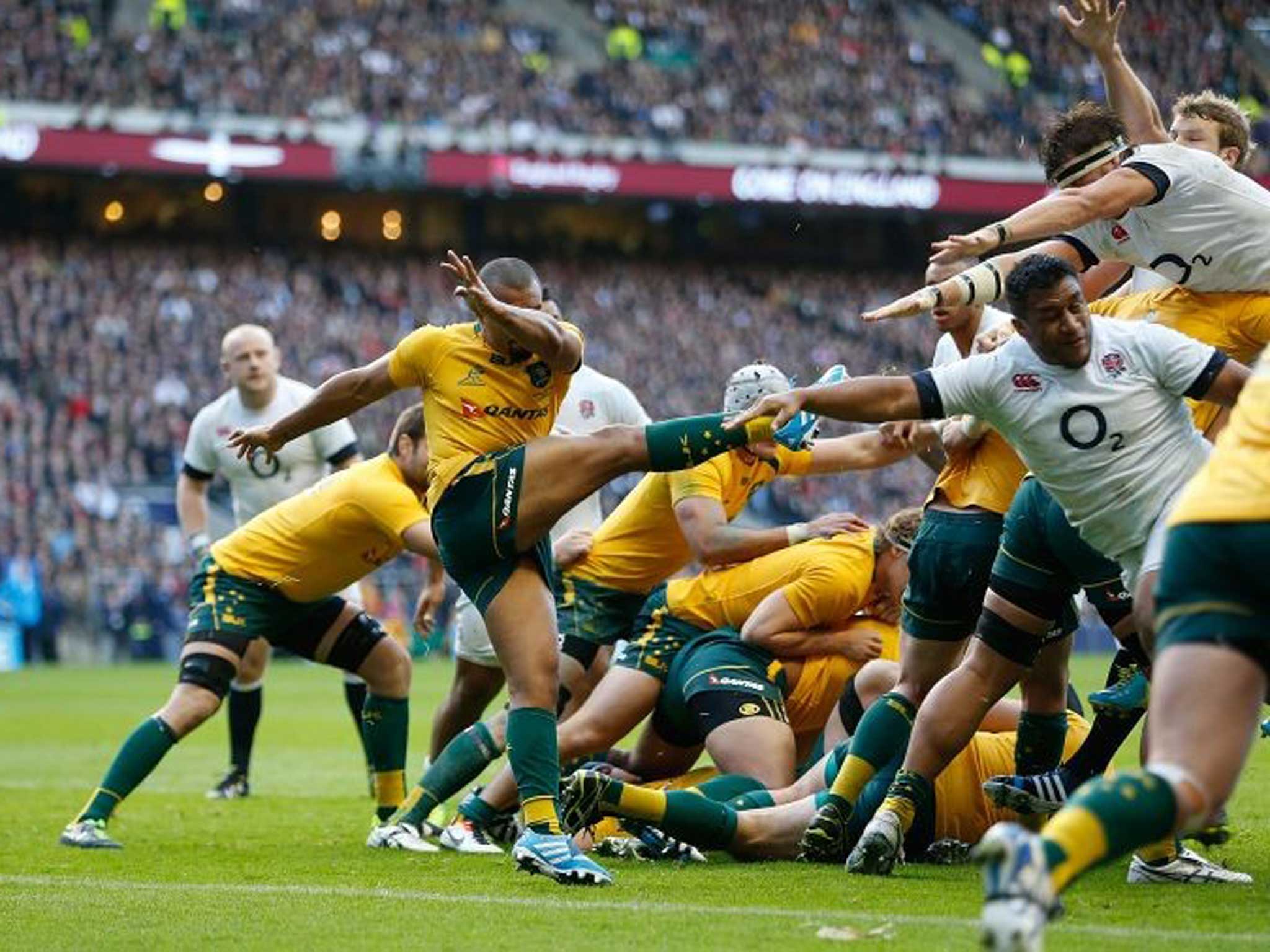Michael Calvin: England rebuilding squandered legacy
The Calvin report: Heroes of 2003 were paraded at half-time but Stuart Lancaster knows a lot of work is still needed to get back to World Cup winning ways

The latest generation of warriors filed out of the home dressing room and past a mural which proclaimed: "Hundreds before you. Thousands around you. Millions behind you." It is what is in front of this England team which matters most.
On an autumnal afternoon infected with the slow-acting poison of nostalgia, they ground out the most significant of victories over Australia at Twickenham. A pivotal season is under way, the right way.
It is a stretch to suggest that this weekend two years hence will see them emulate the World Cup heroes of 2003, who were paid almost apologetic homage at half-time yesterday. Yet there were signs of strength of character and the resilience required in times of adversity.
For all England's willingness to match the urgency and intensity of the southern hemisphere, the All Blacks will not be as forgiving as the Wallabies, who have won only three times in this calendar year. Stuart Lancaster's squad remain a work in progress.
Defeat would have been devastating, and the contrasts of the half-time interval, when England trailed 13-6, were ominous. Australia obeyed the edict of Ewan Mackenzie, their new coach, and stayed out on the pitch. They were men at work. They perched on drinks boxes and pointedly ignored the entrance of England's World Cup winning squad.
They may be immortals in a rugby sense, but they have finite relevance. These were men from a different era. Their legacy was largely squandered. Their desultory stroll around the pitch seemed almost inappropriate. In elite sport the achievements of yesterday must always be overshadowed by the ambitions of tomorrow.
Comparisons were inevitable and instructive. It was natural, if unfair, that Owen Farrell and Chris Robshaw should be judged against Jonny Wilkinson and Martin Johnson.
Farrell's first England try was ultimately decisive, but his fortitude in defence and refusal to dwell on first-half fallibility underlined his development. Robshaw might not be as vocal as Tom Wood, his natural rival for the captaincy, but he has a quiet authority.
He spoke of pride and spirit with impressive earnestness, and has the hardest of acts to follow. The craggy Johnson was unmistakeable, and though he was treated with due respect, the recognition had a maudlin edge.
The iconic figure who lifted the William Webb Ellis Trophy a decade ago was subsequently diminished as England manager. Only now is his betrayal by those of another era and a different mindset being addressed by Lancaster.
The current coach has been obliged to restate the obvious: that the England jersey is a sacred piece of cloth. He is a more convincing figure than Sir Clive Woodward, whose professorial pretensions mask the fact he has been searching, with little apparent success, for fulfilment since that unforgettable evening in Sydney's Olympic Stadium.
Wilkinson, a Zen Master made of porcelain, did his best to enthuse about the rituals of remembrance: "When you say 'Hi' for the first time it brings it all back," he said. "You need everyone around you. If it was easy you wouldn't have these friendships, these relationships."
He had an icy detachment in those freeze-frame moments in Sydney. Farrell is less deliberate in his kicking, yet no less exposed. He slotted his first kick from 40 metres, but hooked his next two from similar range.
When another attempt bounced out off the inside of the right-hand post, there was an audible moan. Little wonder Mike Catt, acting as a water carrier, proffered a consoling word and a supportive tap on his backside before Farrell steadied himself by kicking a close-range penalty.
The signs of struggle were subtle as the inner game played out. Farrell licked his lips, a sure sign of supressed tension, before converting Robshaw's opportunist try, but had the presence of mind to spot the gap between Stephen Moore and Ben Mowen, which had been opened by the artfully positioned Dylan Hartley.
Lancaster was without five Lions, including England's first-choice centre partnership, but believes the momentum established yesterday can be accelerated against Argentina next Saturday.
"I'm pleased to get the win," he said. "We didn't have it all our own way in the first half, but I was pleased with the composure we showed. That was about keeping patient and not chasing the scoreboard. We had a lot of young lads making their first starts at Twickenham. The replacements made a difference and I think we deserved it in the end. We didn't get everything right in the last 20 minutes but we did enough."
Whether Twickenham will ever be transformed into "the hurt arena", to quote Andy Farrell's optimistic call to arms, is open to doubt. The old ground is more like a club-class lounge. Middle England still declines to really roar the anthems, a gentle belch following the car-park picnics.
And the petty excesses of the marketing men predominate. England's unique hashtag is #carrythemhome. It is probably too much to hope that it be consigned to history's dustbin, but that, like yesterday's win, would come as a blessed relief.
Subscribe to Independent Premium to bookmark this article
Want to bookmark your favourite articles and stories to read or reference later? Start your Independent Premium subscription today.

Join our commenting forum
Join thought-provoking conversations, follow other Independent readers and see their replies